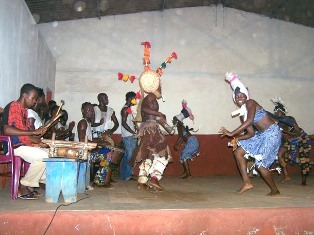Unit 2 Introduction
Reading: Chapter 2 in Macionis, pp. 39 - 67
The topic for the second week is culture, simply defined as the way people habitually think and act in social groups. Culture encompasses how people think, what they believe, what they value, what they create and how they act. Culture is shared among a group of people; people who hold the same (or similar) beliefs, values and actions, and who find the same meaning in material goods, gestures, symbols and other graphic representations can be said to share a culture. Culture establishes what is right and wrong, what is normal and deviant, what is beautiful and ugly, what is valid knowledge and what is representative of a group of people.
 Fig. 2-1: African Dance Company, Conakry, Guinea |
Culture is perhaps the broadest concept in sociology. Understanding the many aspects of culture requires you to expand your thinking and to look at the big picture. At the same time, culture is one of the most personal aspects of sociology, in the sense that our own culture is deeply engrained in our beings. In fact, culture is so much a part of us that we generally take it for granted, and do not recognize the effects that culture has on us.
Without culture humans would likely not survive as a species. We rely heavily on culture, and by extension on others, and without culture life would hold no meaning.
How can we understand culture? To see what to us appears normal, we need a basis for comparison. Looking into history or looking to other cultures helps understand both our own cultural traits and the concept of culture. Comparing subcultures in a diverse society can also help us grasp our own culture.
In Unit 2 you will learn to stretch how you think about yourself, your friends, and human behavior.
GO TO WEEK 2 GOALS AND OBJECTIVES>>>
<<<GO TO WEEK 1 THRU 5 SCHEDULE